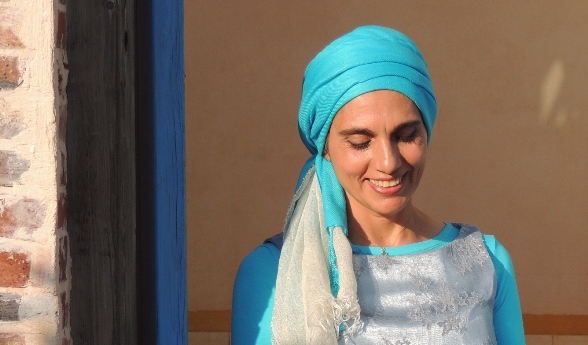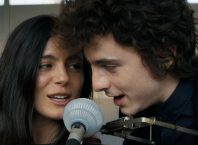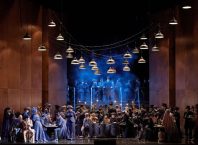Wikipedia tells us that the Oud is “a pear-shaped stringed instrument commonly used in Greek, Byzantine, North African (Chaabi, Classical and Andalusian) and Middle Eastern music…the modern oud and the European lute both descend from a common ancestor via diverging paths. The oud is considered an ancestor of the guitar.”
Somehow, this doesn’t seem quite enough. Let’s try again:
“The Oud is a melodious stringed instrument, common to most musical cultures across the Mediterranean and north Africa. Folklore place its origins as far back as the book of Genesis: historical records reveal evidence of its existence more than 5000 years ago. In a region beset with strife, animosity and the continuous attempt to recalibrate history according to one’s wishful thinking, the oud remains a symbol of continuity, a bridge across disparate cultures.”
That reads just that bit better, doesn’t it?
The oud is sometimes described as the King of musical instruments: next month, the monarch will be in residence in Jerusalem, as the city plays host to the International Oud Festival between the 8th and the 17th of November. In its 13th year, the festival has consistently distinguished itself by celebrating heroes of the past and facilitating collaborations that emphasise the continuing vitality and versatility of the oud: the instrument and the festival are at once a pathway into the antiquated musical traditions of the Middle East and a reminder that there is more that we have in common than there is that separates us in this corner of the world.
True to its own traditions, many of the performances at this year’s festival will be unique interpretations of ancient and modern works, drawing out the connection between Arab and Persian classical music and the Jewish piyyutim.

Etti Ankri has a rich and diverse biography as a performer. One of Israel’s leading singers in the pop and ballads tradition in the 1990s – as well as a noted actress – in recent years she has drawn closer to her religious Jewish roots; most recently, she has produced an acclaimed adaptation of the poet Yehuda Halevi to music. Continuing this thread of introspective re-discovery, Mama Zehyerel is shaped by the Tunisian melodies and rhythms that Ankri learned in childhood through her grandmother, who was born on the Island of Jerba in Tunisia. The nine-piece ensemble will bring melodies from Ankri’s childhood to a contemporary audience, an act of ethnography and a celebration of Tunisian heritage.
In much the same vein, the Arab Orchestra of Nazareth do not aim for understatement in their presentation of The Four Greats: Muhamad Abd al-Wahab, Farid al-Atrash, Lalya Mourad and Asmahan.
Controversial at times for incorporating western rhythms in his melodies, Muhamed al-Wahab nonetheless was one of the most prolific and popular composers of his age, his works including the national anthems of Tunisia and the current transitional government of Libya. Farid al-Atrash was a composer, singer and actor, well known throughout the Arab world as much for his voice as for his ways as a roué and ladies man. Still remembered – almost 40 years after his death – as the King of the Oud, al-Atrash is one of the leading figures of 20th century Arab music.
His sister, Amal al-Atrash – commonly known by her stage name, Asmahan – was considered “the only voice to rival Umm Kulthum”, and had shaped a career for herself singing the compositions of her brother and Al-Wahab before her untimely – some say mysterious – death in a car accident in 1944. Layla Mourad, half Ashkenazi and half Mizrachi, converted to Islam and was chosen as the official voice of the Egyptian Revolution following the overthrow of King Farouk in 1953. Her Jewish roots sometimes the cause of much controversy, as was the not-terribly simple matter of whether Nasser preferred her over Umm Kultham. Nonetheless, she always occupied a precious place in the heart of the Egyptian public, and was a legend long before her death in 1995. The songs of all four will be presented by Avi Cohen, Mamun Zayud and Lubna Salameh, with the Orchestra conducted by Dr Nizar Radwan.

Yair Dalal is a virtuouso of the oud and the violin, his work drawing from influences as far flung as Jewish-Iraqi melodies, Bedouin folk music and classical music from both East and West. And You Love, his concert at the festival, will be built around songs from his new album Ve-ahavta and presents ancient piyyutim, texts from rabbinical literature, poetry, Bedouin love songs and the John Lennon songbook. A diverse evening is promised.
Arabop is a term devised by the Nazerene guitarist Michel Shajwari to describe his musical vision, falling between Arab makam scales and the improvisations of be-bop Jazz. His work doesn’t really favour one over the other, rather being something of a frenetic interpolation of the two finding common ground along the way. His performance is an opportunity to witness the meeting of two worlds.
Much is made – in theory, at least – of the capacity of music to bring together divided communities. A practical exposition of this theme at the festival will be presented courtesy of Local Andromeda – A Journey on Route 6, a composition by Ronen Shapira for the Jewish-Arab ensemble of the Israel Philharmonic, which takes its inspiration from the trans-national Route 6, a place “where Israeli and Palestinian realities intertwine.” There is, of course, the symbolism of the mixed ensemble performing the work; but there is also the opportunity to contemplate the reality of two people sharing one space, and what this entails in fact.
The Jerusalem International Oud Festival, 8th to 17th November 2012
http://www.confederationhouse.org/en/festival/international-oud-festival





